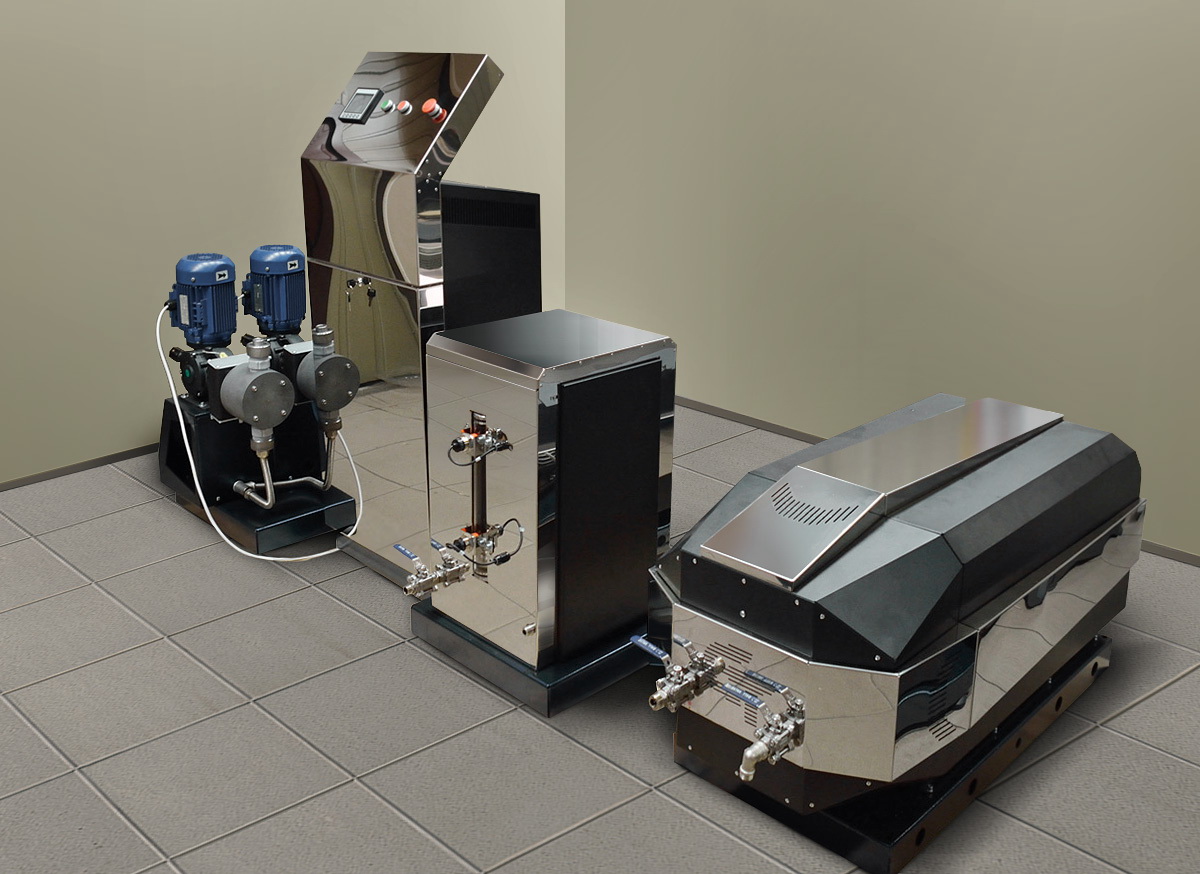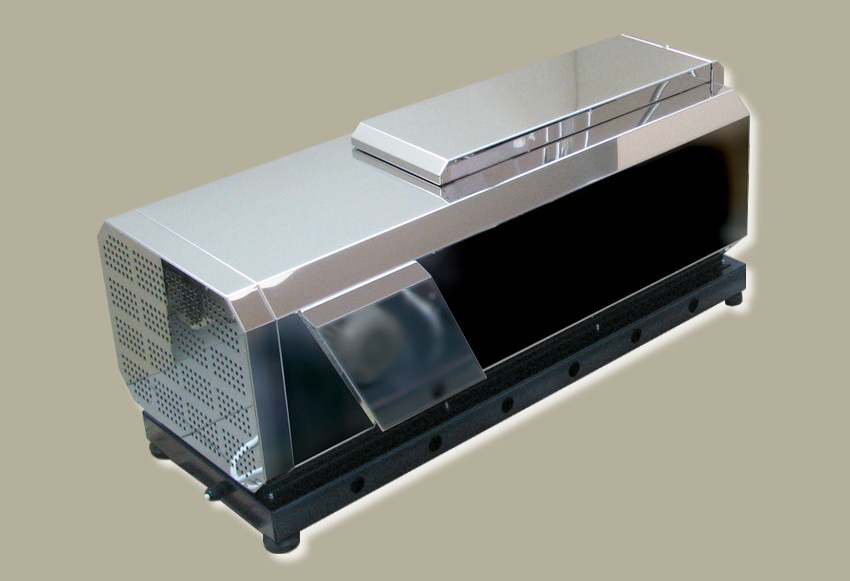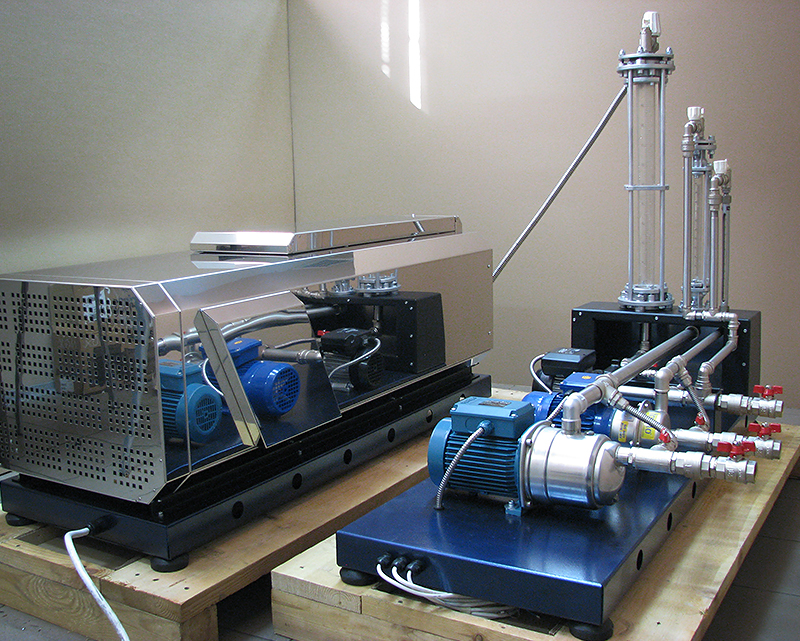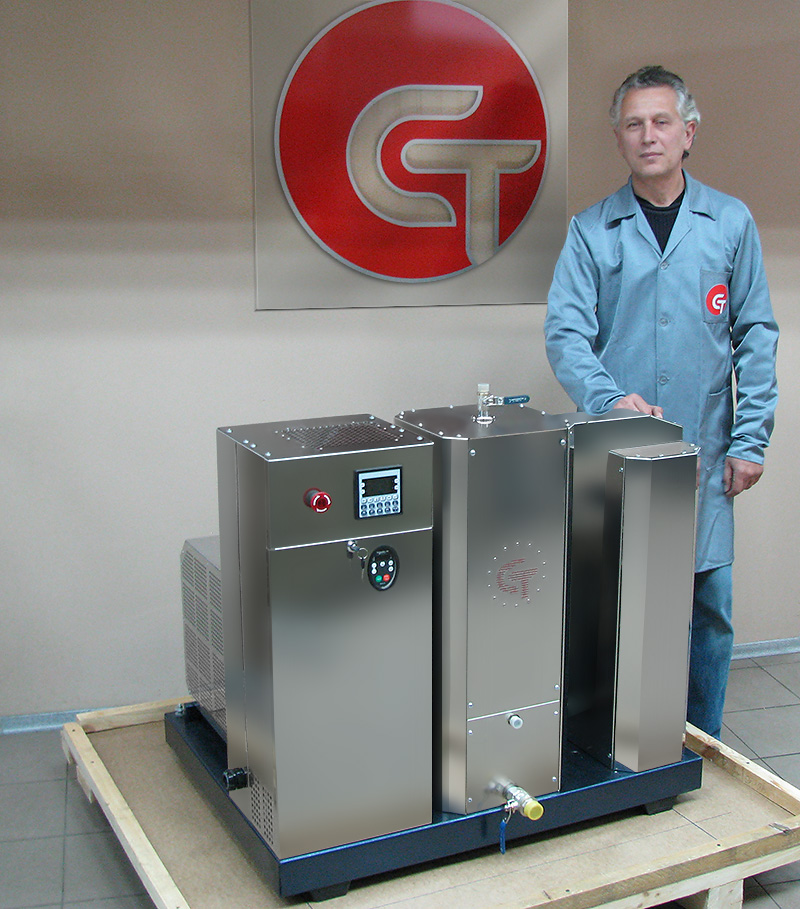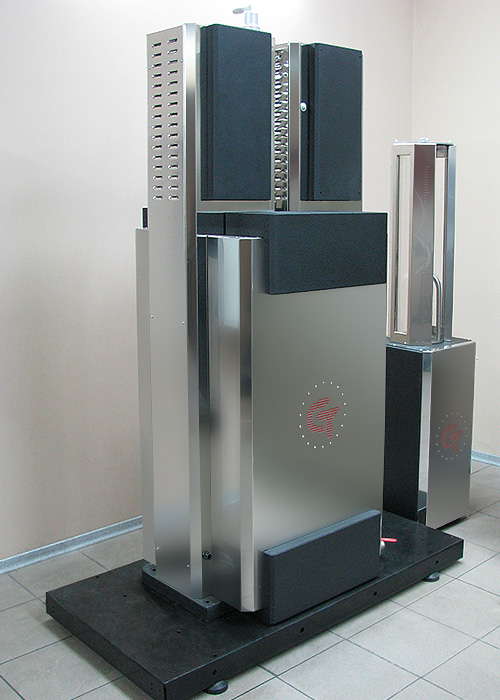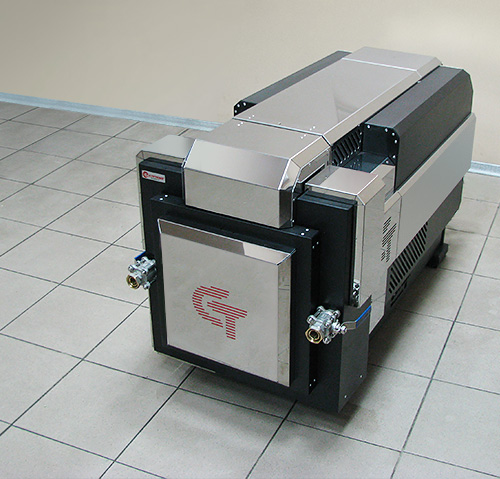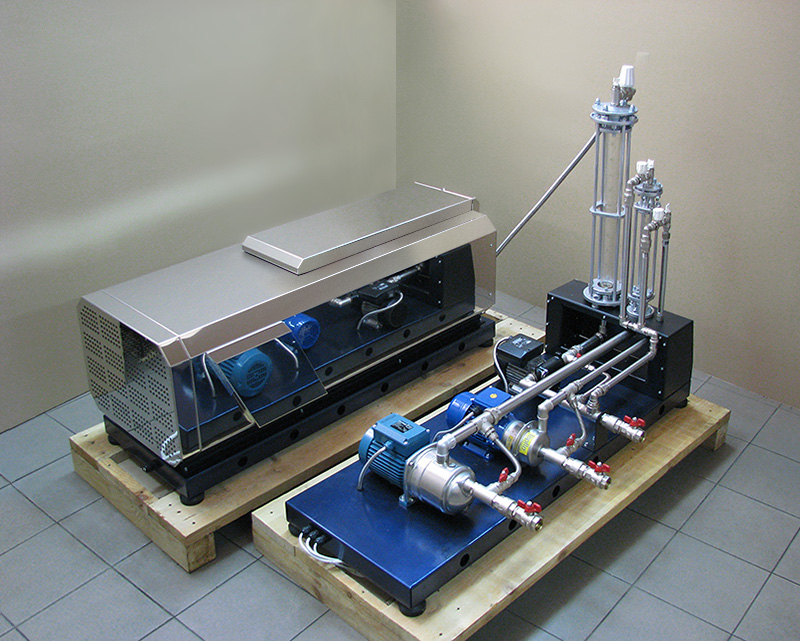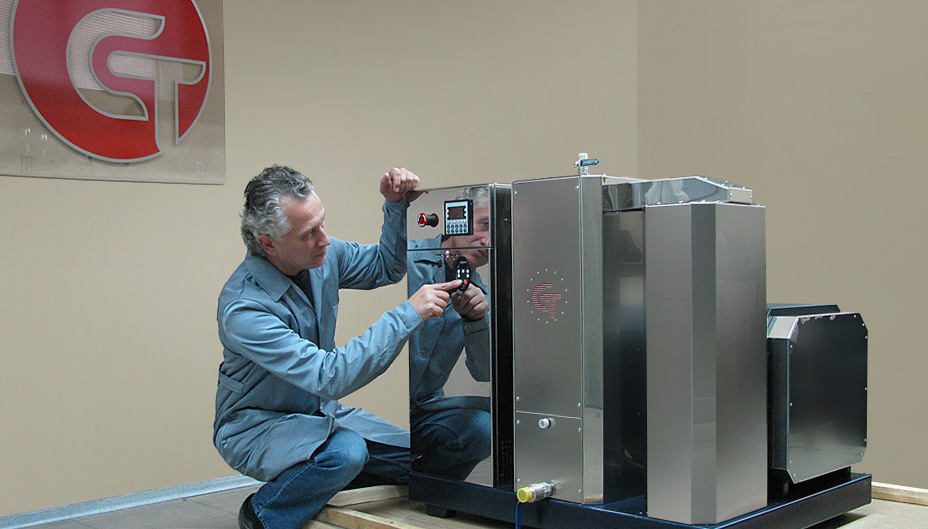
Application range:
- Pre-cracking oil processing
- Homogenized fuel production
- Water-black oil emulsion production
- Coolant lubricants preparing and sterilization
Pre-cracking oil processing
Oil is high-molecular, heterogeneous liquid. Its molecules in atmospheric pressure and normal temperature conditions are complex-directed. Thus the energetic balance of intermolecular and external forces is achieved. When exerting to oil the external pressure in some hundred atmospheres, the molecules are beginning to polarize, with counteraction to external forces and keeping the system balance. If external pressure is suddenly taken off, the internal forces start to break off macromolecules on smaller components, thus the density of oil decreases. On this principle the pre-cracking processing of oil and oil products in HIGH-FREQUENCY HYDRODYNAMIC CAVITATORS PULSOIL-CT is based.
The flow of oil products, while going through PULSOIL-CT, is coming to breakaway cavitation area (zone). The impulse sequence frequency depends on PULSOIL-CT’s geometric parameters and lies in interval from 500 up to 25000 Hz. All the oil flow goes through high-effective cavitation zone. When cavitation bubbles collapse in a very small period of time (less than 1 microsecond) the temperature of flow rises to some thousand degrees Celsius with pressure exceeds 1000 atmospheres. In this way directly in flow the above specified conditions for oil treating are created. Owing to high stability of working frequencies the high homogeneity of end product is achieved with light oil products output rising up to 3-5%.
It should be noted, that this technology gives a possibility not to dehydrate oil, containing up to 20% of water, but under influence of ultrasonic cavitation to involve it into chemical reactions, resulting in formation of spirits, simple and complex ethers. As a result the fuel calorific value increases with its production cost reducing.
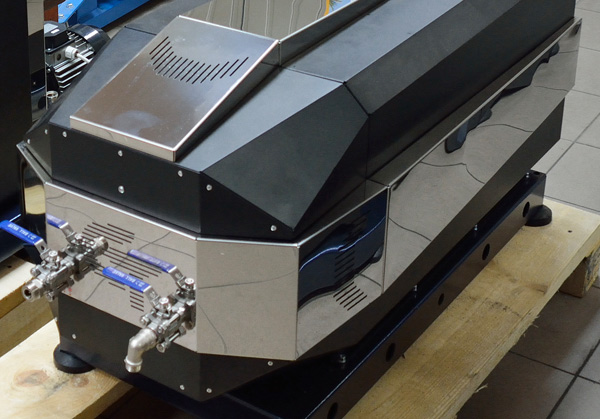
Homogenized fuel production
Conventional fuel, along with carbons, contains also molecules of water, paraffin solutions and sulfur with mechanical impurities. The major portion of fuel molecules are in polymerized (fixed) state. With such mixture combustion, the burning process begins on active side of every large (“cohered”) polymeric link. Simultaneously, the burning process will be inhibited by collision of fuel and water polymer molecules and combustion of paraffin solutions and sulfur will not be complete. It results in combustion deceleration, toxic waste formation and incomplete fuel mixture combustion in general.
The cavitation fuel processing in PULSOIL-CT leads to a number of positive changes, influencing on fuel caloricity and combustion quality. The fuel molecular polymeric chains are break apart, forming a great number of molecules active sides, which involved into oxidation process simultaneously and more quickly. During the molecules breakage in cavitation, the molecular links of those molecules are break apart, forming free radicals with more combustion capacity, than closed molecules. The water molecules chains are also break apart with H and OH free radicals forming, which are coming into combustion process more actively with creating of unstable, easily oxidizing combinations with free radicals of organic fuel. Sulfur and paraffin during the cavitation break-up process are forming surface-active agents, which like a wrapper surround emulsion micro particles with their further sticking together process prevention.
The advantages fuel cavitation processing in PULSOIL-CT:
- Fuel consumption decrease up to 20%
- Engine power increase, up to 5 hp
- Decrease of CO and CH blowout for 40%-50%
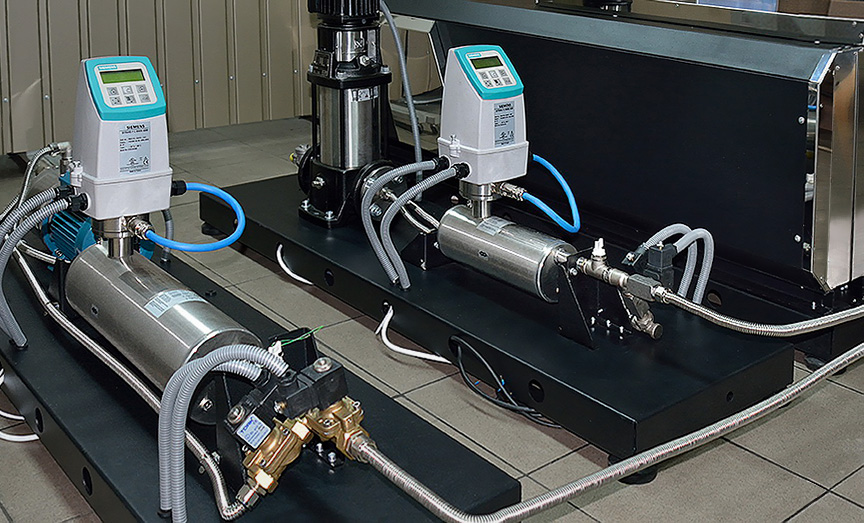
Water-black oil emulsions production
During the cavitation processing, black oil (mazut) is transforming into homogeneous suspension, with completely mixed all light and heavy (bitumen) fractions, and also water and solid particles. That improves the atomizing burners functioning: reducing of nozzles clogging, forming of uniform and stable (without fluctuations) flame cone with decreasing of soot build-up. Burners, in case of load reduce, are working steady. The negative influence of water contained in black oil is minimizing. During the combustion process, it is possible to replace the black oil with water-black oil emulsion (with water content up to 10%) for saving about 5% of black oil without any deterioration of boilers technological parameters. It is possible to replace the expensive sorts of black oil with low-grade ones with keeping of all main physical and chemical properties of fuel in water-black oil emulsions (combustion heat, viscosity, etc.)
The replacement of black oil with high-quality water-black oil emulsion with further combustion in low-power boilers (up to 1.5 m3 per hour capacity) is providing the possibility of:
- Increasing of heat boiler efficiency for 3-5%;
- Decreasing the blowout of harmful matters to atmosphere (for example, decreasing of CO and soot – two times, NOx – at 25-50%, SO2 – at 30-70%);
- 1.5-2 decreasing of soot build-up on heat exchanger surface in a boiler;
- Decreasing of high temperature fuel heating before the combustion;
- Reducing of fuel consumption rate for 3-6%;
- Avoiding the bottom water output with their entering into emulsion.
PULSOIL-CT can be installed directly in black oil supply to nozzles line, but also can be used for long-term storage tanks filling. Suspension structure is preserving its parameters for more than a half year, with avoiding of layers build-up in tanks, significant deposits volume reducing and uniform water distribution through the all emulsion volume. Such black oil has a less viscosity, with consequent significant facilitation of its transporting through pipelines.
Coolant lubricants preparing and sterilization
The most effective is a technology of cooling lubricants treatment with ultrasonic dispersion and sterilization. The PULSOIL-CT is the most suitable appliance for this purpose. Due to acoustic sound and ultrasonic vibrations and cavitation effect, cooling lubricants are disinfected, with their technological efficiency and layering resistance increase.
BLAZAR-CT: NEW HYDRODYNAMIC CAVITATION PROCESSOR
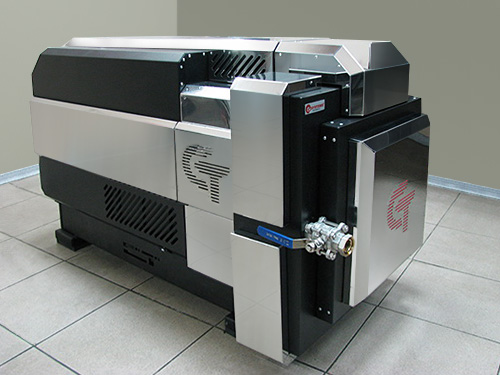
“Blazar-CT” is a new generation of hydrodynamic cavitation processors.

